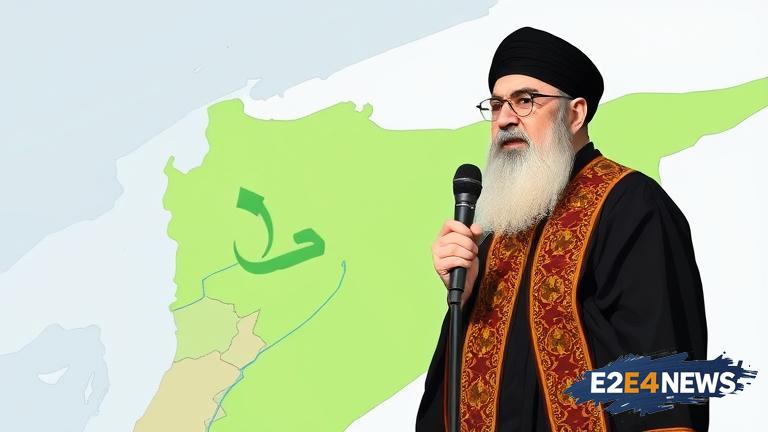The Syrian Druze community, a minority group residing primarily in the southern region of the country, has been facing significant challenges in recent years. Led by Sheikh Hamoud al-Hijri, the community is now calling for international support in establishing an autonomous region. This move is driven by concerns over security, minority rights, and the need for self-governance. The Druze community has historically been an integral part of Syrian society, but the ongoing conflict has exacerbated tensions and highlighted the need for greater autonomy. Sheikh Hijri’s appeal for international support is aimed at securing a safer and more stable future for the Druze people. The proposed autonomous region would allow the Druze community to manage its own affairs, ensuring the protection of its cultural heritage and religious practices. This development comes as the Syrian conflict continues to unfold, with various factions and international players involved. The Druze community’s quest for autonomy is not isolated, as other minority groups in the region are also seeking greater self-governance. The international community’s response to Sheikh Hijri’s call will be crucial in determining the future of the Druze community and the broader Syrian landscape. The establishment of an autonomous Druze region could potentially serve as a model for other minority groups in the Middle East, promoting greater stability and diversity. However, this endeavor also faces significant challenges, including opposition from certain factions and the complexities of implementing self-governance in a conflict zone. Despite these hurdles, the Druze community remains committed to its goal, driven by the belief that autonomy is essential for its survival and prosperity. The Syrian government’s stance on the matter is also being closely watched, as its response will significantly impact the feasibility of the proposed autonomous region. Meanwhile, international organizations and human rights groups are being urged to support the Druze community’s bid for autonomy, citing the importance of protecting minority rights and promoting peaceful coexistence. As the situation continues to evolve, the global community is being called upon to play a more active role in supporting the Druze community and other minority groups in the region. This includes providing diplomatic, economic, and humanitarian support to help establish a stable and secure environment. The long-term implications of an autonomous Druze region are far-reaching, with potential benefits including increased security, economic development, and cultural preservation. Nevertheless, the path ahead is fraught with challenges, and the international community’s engagement will be vital in overcoming these obstacles. The Druze community’s struggle for autonomy serves as a reminder of the complexities and nuances of the Syrian conflict, highlighting the need for a comprehensive and inclusive approach to resolving the crisis. By supporting the Druze community’s bid for autonomy, the international community can help promote a more stable and diverse Middle East, where minority rights are protected and all communities can thrive. The call for international support has sparked a wave of solidarity with the Druze community, with many recognizing the importance of promoting minority rights and self-governance. As the global community responds to Sheikh Hijri’s appeal, it is essential to consider the broader implications of this development, including its potential impact on regional stability and the future of minority groups in the Middle East. The Druze community’s quest for autonomy is a testament to its resilience and determination, and its outcome will have significant repercussions for the entire region. In conclusion, the Syrian Druze community’s call for international support in establishing an autonomous region is a critical development that warrants attention and action from the global community. By backing this initiative, the international community can help promote stability, diversity, and minority rights in the region, ultimately contributing to a more peaceful and prosperous Middle East.
